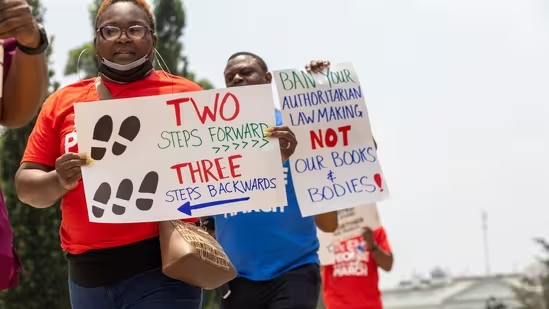What is US Supreme Court's verdict on affirmative action that allowed universities to factor in race-based admissions?
In a historic ruling, the United States Supreme Court on Thursday said that race could no longer be considered a factor in college and university admissions.

The landmark ruling has altered decades-old practice by universities of taking affirmative action, which is also known as positive discrimination. Being one of the most significant factors in the US education system, affirmative action has been essential since it made its way through policies in the 1960s and has long been seen as a measure to increase diversity in US colleges.
What is affirmative action?
In terms of higher education, affirmative action is a group of admission policies that are devised and utilised by colleges and universities that are aimed at increasing the number of Black, Hispanic and other minority students on campuses.
The colleges and universities that employ this approach and take race into consideration do so as a part of a holistic application review process that includes analysing grades, examination scores, extracurricular activities along with all other aspects of an application.
Race-conscious admission policies are designed in order to increase student diversity and offer an enhanced educational experience to all students.
Read Here: How SCOTUS’s affirmative action ruling impacts college admissions
While almost all colleges and universities in the US offer several scholarship programmes and recruitment opportunities, the Supreme Court’s ruling was specific to only admissions.
What was the Supreme Court’s ruling?
The Supreme Court was covering two cases involving admissions at Harvard and University of North Carolina (UNC). The eight-judge bench ruled 6 to 3 against Harvard and 6 to 2 against UNC.
Chief Justice John G. Roberts Jr, speaking for the majority wrote, “The Harvard and U.N.C. admissions programs cannot be reconciled with the guarantees of the equal protection clause. Both programs lack sufficiently focused and measurable objectives warranting the use of race, unavoidably employ race in a negative manner, involve racial stereotyping and lack meaningful end points.”
While the majority opinion noted that the policies were “well-intentioned”, Roberts said, “Many universities have for too long wrongly concluded that the touchstone of an individual's identity is not challenges bested, skills built, or lessons learned, but the color of their skin.”
He further wrote, “Harvard's admissions process rests on the pernicious stereotype that 'a black student can usually bring something that a white person cannot offer.”
The second black justice in the US and a conservative Justice Clarence Thomas agreeing with the majority said that such programmes were "patently unconstitutional".
He said, “Universities' self-proclaimed righteousness does not afford them license to discriminate on the basis of race.”
Read Here: Equality, meritocracy, diversity! What does US court's ruling on ‘affirmative action’ entail for Asian-Americans?
Expressing her dissent, in a rare move to portray disagreement, Justice Sonia Sotomayor, said that affirmative action was significant to counter “persistent and systematic racial discrimination”.
In a written dissent, she said, “The court subverts the constitutional guarantee of equal protection by further entrenching racial inequality in education, the very foundation of our democratic government and pluralistic society.”
First black woman appointed to the court, Ketanji Brown Jackson, expressed her dissent stating that the judgement was “truly a tragedy for us all”.
She said, “With let-them-eat-cake obliviousness, today, the majority pulls the ripcord and announces 'colorblindness for all' by legal fiat.”
Students for Fair Admission, a non-profit organisation, had filed both the cases in the Supreme Court. The organisation, founded by legal activist Edward Blum, celebrated the win.
Blum said that is was “the beginning of the restoration of the colorblind legal covenant that binds together our multi-racial, multi-ethnic nation. These discriminatory admission practices undermined the integrity of our country's civil rights laws.”
What were the two cases?
The case made against Harvard accused the university of discriminating against Asian American students by considering factors like likability, courage and kindness and they stated that the university created a ceiling for them during admissions.
Lawyers appearing for Harvard said that petitioners had relied upon flawed statistical analysis and denied any discrimination conducted by the university against Asian American students. However they stated that the race-conscious policies employed by the university were lawful.
Read Here: Biden slams SC verdict barring race to be considered as factor in college admissions
The case against UNC, which is a public university and hence cannot resort to race based discrimination, stated that the university discriminated against white and Asian applicants while giving preference to Black, Hispanic and Native American students.
The university stated that it was fostering educational diversity through its admission policies, which were lawfully following Supreme Court precedents.
How did US leaders react to the ruling?
Several democrats including US President Joe Biden said that the ruling was a step backward. Addressing the nation, Biden said that the ruling should not be considered “the last word” in affirmative action case.
He said, “Discrimination still exists in America. Today’s decision does not change that.”
Former President Barack Obama said that while affirmative action was not perfect, it "allowed generations of students like Michelle and me to prove we belonged."
Former first lady Michelle Obama said that her "heart breaks for any young person out there who's wondering what their future holds".
However, Conservative leaders celebrate the ruling. chairman of the American Conservative Union Matt Schlapp said that the ruling, along with Supreme Court’s last year’s abortion ruling, “serve as a triumphant return to restoring our tattered Constitution”.
Disclaimer: The copyright of this article belongs to the original author. Reposting this article is solely for the purpose of information dissemination and does not constitute any investment advice. If there is any infringement, please contact us immediately. We will make corrections or deletions as necessary. Thank you.
Title:What is US Supreme Court's verdict on affirmative action that allowed universities to factor in race-based admissions?
Url:https://www.investsfocus.com









